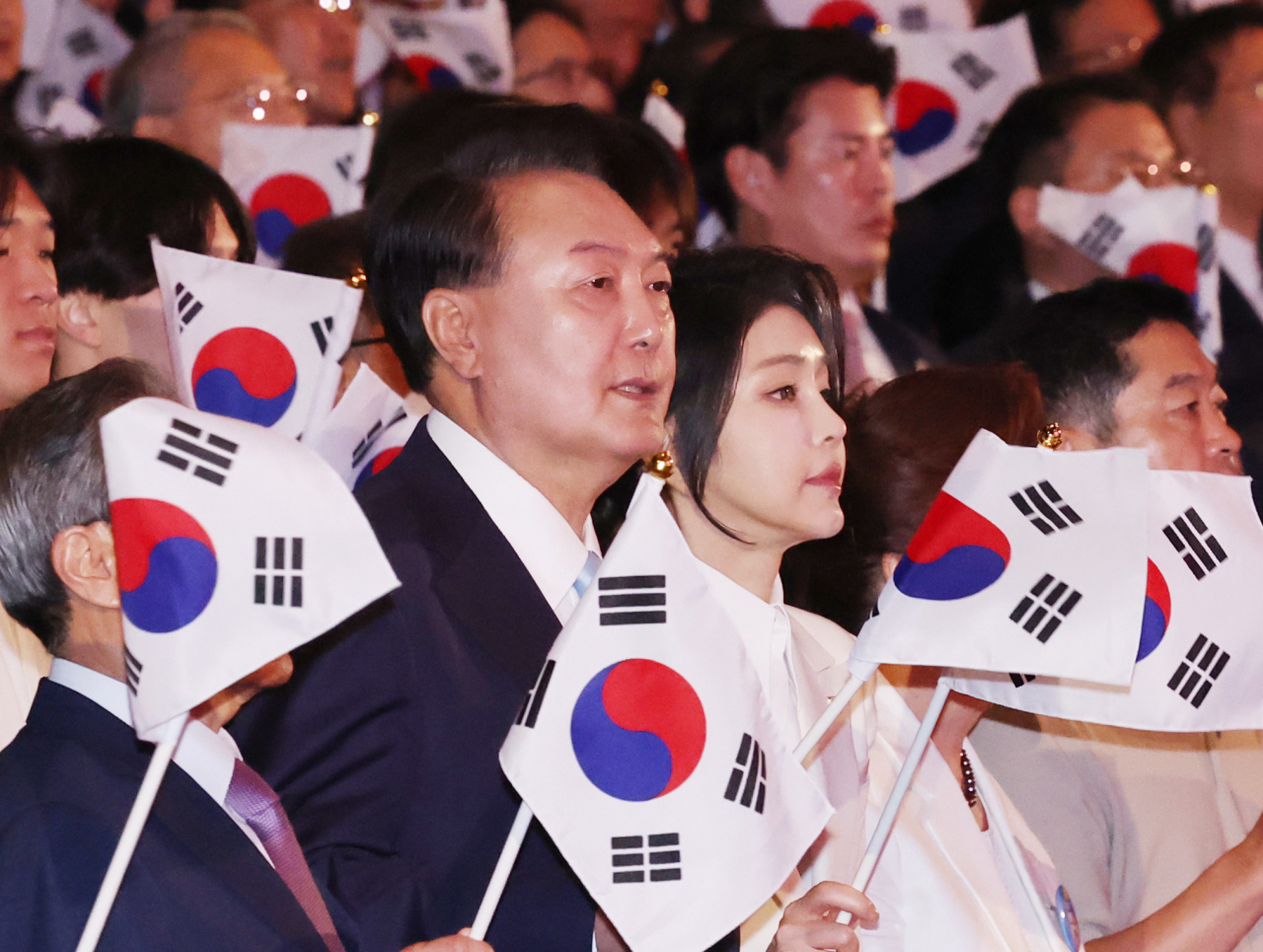
 |
| President Yoon Suk Yeol, center left, holds a the national flag of the Republic of Korea, also known as the Taegeukgi, next to first lady Kim Keon Hee, at the 79th Liberation Day ceremony, held at the Sejong Art Center in central Seoul on Thursday. (Yonhap) |
President Yoon Suk Yeol on Thursday unveiled a new vision for unification, stressing that "complete liberation remains an unfinished task" as long as the Korean Peninsula remains divided, during his speech commemorating Korea's liberation from Japanese colonial rule from 1910 to 1945.
However, his vision for a unified Korea, presented at the 79th Liberation Day ceremony, was overshadowed by internal discord within South Korea. Independence activist groups and opposition parties boycotted the event in protest of his controversial appointment of a conservative professor to lead the Independence Hall of Korea.
"The freedom we enjoy must be extended to the frozen kingdom of the North, where people are deprived of freedom and suffer from poverty and starvation," Yoon said at the ceremony, held at the Sejong Art Center in central Seoul.
"Only when a unified free and democratic nation rightfully owned by the people is established across the entire Korean Peninsula will we finally have complete liberation," he added.
Highlighting the need for unification, Yoon rolled out three pillars for South Korea to achieve the goal: defending South Korea's freedom based on the spirit of democracy from "false propaganda" and "pseudo-logic," being proactive with human rights improvements in North Korea to bring about changes there, and boosting cooperation with the international community.
Extending an olive branch to North Korea, Yoon declared, "We will keep the door to inter-Korean dialogue wide open."
"Inter-Korean dialogue should not be merely a political spectacle but rather serve as a substantive opportunity to discuss, for instance, a guarantee of peace for our people and North Korea's and ways to improve their lives," Yoon said, after pledging to help North Korean defectors settle in South Korea.
In line with his proposal for dialogue, Yoon also suggested launching an inter-Korean working-level group that would tackle key issues such as economic cooperation and disaster responses.
"This body could take up any issue, ranging from relieving tensions to economic cooperation, people-to-people and cultural exchanges, and disaster and climate-change responses," he said. "We will also be able to discuss pending humanitarian issues, such as separated families and South Korean prisoners of war, abductees and detainees still kept in the North."
But at the same time, Yoon emphasized the need for North Korea to take steps towards denuclearization, saying that the inter-Korean "political and economic cooperation" will begin the moment Pyongyang decides to do so.
Nuclear negotiations between the North and the United States have remained in limbo since the collapse of the 2019 Hanoi summit between then-US President Donald Trump and North Korean leader Kim Jong-un.
Inter-Korean relations have remained frozen in recent years, highlighted by heightened tensions across the border. In June, South Korea resumed propaganda loudspeaker broadcasts near the border with North Korea for the first time since January 2016.
North Korea has launched more than 3,600 trash balloons since May 28 across the border in a tit-for-tat move against South Korean civic groups' balloons carrying propaganda leaflets criticizing Kim Jong-un.
While it is customary for South Korean presidents to mention diplomatic ties between South Korea and Japan in their annual Liberation Day speeches, Yoon did not do so for this year's event. He only mentioned Japan briefly before wrapping up the speech to point out Korea's expanding per capita income.
"Last year, Korea's per capita income surpassed Japan's for the first time and is expected to reach $40,000 by 2026. In the first half of this year, the export gap between Korea and Japan hit a historic low of $3.5 billion," he said.
An official at the presidential office, who declined to be named, told reporters that this reflects Yoon's "confidence" in his country's growing economic power in the ongoing "friendly competition" with Japan.
Meanwhile, some 50 independence activist groups and opposition parties hosted a separate Liberation Day ceremony, on the same day, in protest of the Yoon Suk Yeol administration's appointment of Kim Hyoung-suk as director of the Independence Hall of Korea.
The Heritage of Korean Independence, a state-funded association of independence fighters and their descendants, and the opposition parties including the Democratic Party of Korea warned they would skip the government-organized ceremony if Yoon did not retract his appointment of Kim, who they have accused as being "pro-Japan" regarding Japan’s 1910-1945 colonial rule.
This marks the first time in history, that the HKI held a separate Liberation Day ceremony from the government-organized one, since the association's establishment in 1965.
With some media reports and critics referring to Thursday's government-organized event as a "half celebration," the official at the presidential office labeled such descriptions as "erroneous" and said they plan to "strictly respond" to any rumors.
"Two thousand citizens including descendants of independence fighters attended (the government-organized) celebration to uphold the historic meaning of Liberation Day. We believe it is erroneous for some to describe the event as a 'half celebration' just because a certain organization did not attend," the official said.









